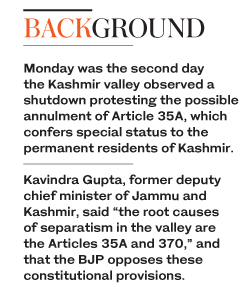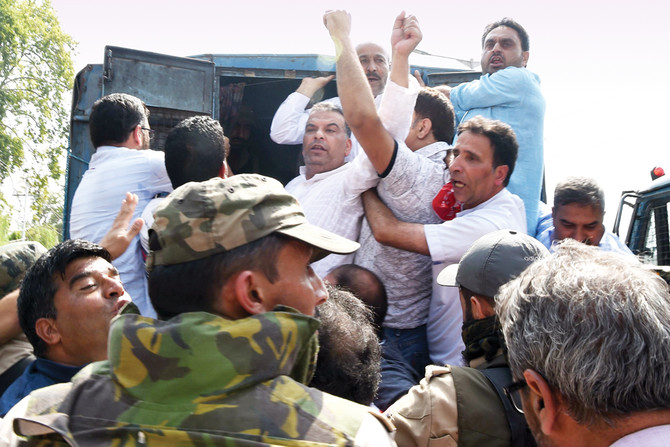NEW DELHI: The Supreme Court on Monday adjourned hearing the petitions challenging the validity of Article 35A, which gives Jammu and Kashmir a special status in the Indian Constitution.
The petitions will now be heard in the week beginning Aug. 27, said Chief Justice Dipak Misra.
Monday was the second day for Kashmir valley observing a shutdown protesting any annulment of Article 35A, which confers special status to the permanent residents of Kashmir and bars people from outside the state from acquiring any immovable property in the state.
Besides Article 35A, Article 370 of the constitution grants special status to Jammu and Kashmir.
A lesser-known nongovernmental organization, We the Citizens, has challenged the validity of these articles in the Supreme Court. The fact that the ruling Bharatiya Janata Party (BJP) is not opposing the petitions in the court has raised alarm bells among the people of Kashmir. 
“No court, whether in India or in Pakistan, has any jurisdiction to take decisions that can in any way affect the disputed status of J&K as its original citizens are yet to exercise the right to determine their final dispensation as promised by the UN and backed by India and Pakistan,’’ said the separatist leader Mirwaiz Umar Farooq in a statement.
Yasin Khan, the chairperson of the Kashmir Economic Alliance, an amalgam of various trade and industrial bodies, said in a press statement that “for safeguarding our rights, we are even ready to give our blood. The attempts are being made to remove Article 35A through the court and we are not going to tolerate it.”
However, BJP leader Kavindra Gupta, former deputy chief minister of Jammu and Kashmir, counters this argument and underlines that “the root causes of separatism in the valley are the Articles 35A and 370,” and that the BJP opposes these constitutional provisions.
Gupta told Arab News that the valley-based parties are using these special provisions in the constitution to run their political shops, “and we don’t want them to succeed in their designs.”
The People’s Democratic Party (PDP), the senior alliance partner of the BJP in the previous government in the Kashmir valley, said: “The ruling party in Delhi is using this issue not for the benefit of Kashmiris but to polarize the voters in mainstream India and win the general elections in 2019.”
Senior PDP leader Nizamuddin Bhat believes that the issue of abrogation of Article 35A and Article 370 did not do the BJP any good.
“It has united all the Kashmiris, be it the separatist Hurriyat (All Parties Hurriyat Conference) or mainstream political parties. They are all now standing on one platform to protect the larger interest of the state.”
He added: “The BJP is having short-term national interest in mind by taking up this issue. The party just wants to capitalize electorally in the next general elections by raking up this emotional and divisive issue.”
Srinagar-based senior journalist Manzoor Ul-Hassan said Articles 35A and 370 are there to protect the basic constitutional rights of Kashmiri people, which makes Kashmir special by giving it an autonomy and a separate identity.
“Any attempt to temper them will have far-reaching consequences and will be opposed by each and every Kashmiri,” Manzoor added.
















